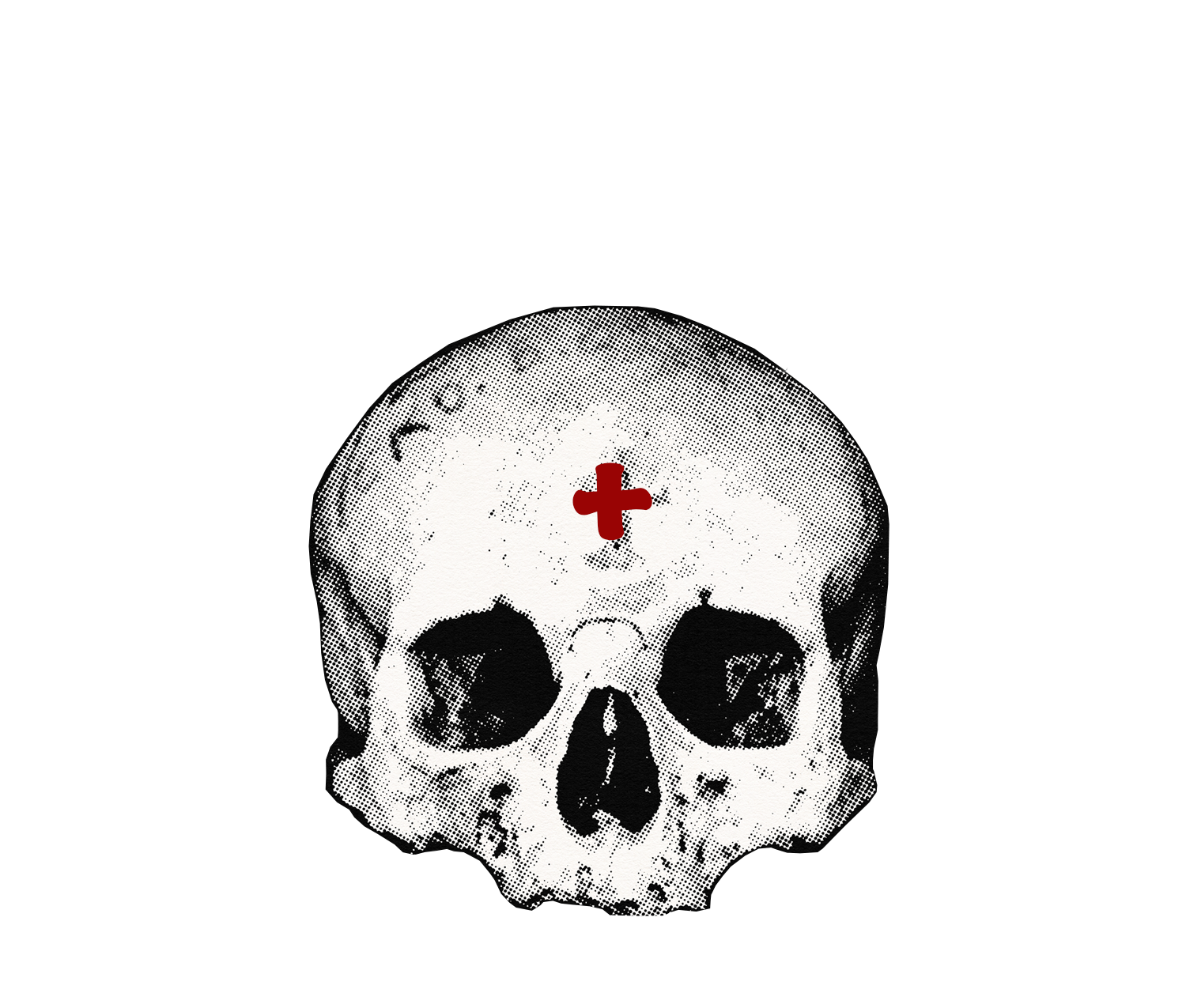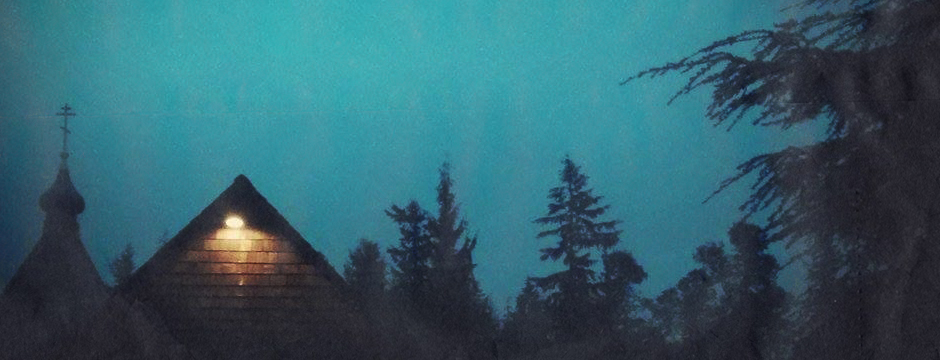What I had pictured as a peaceful and anticipatory trip to All-Merciful Saviour Monastery on Vashon Island was quickly thrown right out the window. My head in a bag for the first half of the trip, I found myself sorely seasick beyond measure as the Victoria Clipper bounced across the violent waves to Seattle. I had been told that the devil often did whatever he could to foil a pilgrim’s trip to such places, but I had never expected this. Needless to say, the sight of Abbot Tryphon waiting for me just outside the ferry terminal was a sight for sore eyes.
I went to the monastery, to tear a page from Thoreau, because I wanted to live deliberately. I went to face myself and see if I could attempt to cut out the rotten heart within me, to have it replaced with a new heart that was all the things that St. Paul said it should be when he wrote that “Love is patient, love is kind. It does not envy, it does not boast, it is not proud. It does not dishonor others, it is not self-seeking, it is not easily-angered, it keeps no record of wrongs. Love does not delight in evil but rejoices with the truth” (1 Cor. 13:4-6).
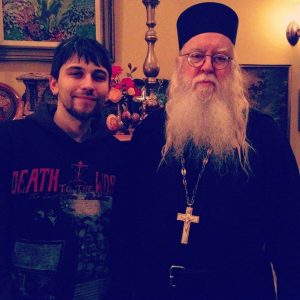 Abbot Tryphon, a priest-monk of the Russian Orthodox Church Outside of Russia, and I have known each other for nearly two years now. Over that time, I have forged a wonderful friendship with him – not only was he a major support for me through some rough times, but also helped me along the way to my conversion from Roman Catholicism to the Orthodox Church. He has constantly shown himself to be a loyal friend, a holy priest, and a compassionate spiritual father to me. It was a privilege also to meet with his fellow monks, the young contemplative Fr. Moses, as well as Fr. Paul and Subdeacon Gideon.
Abbot Tryphon, a priest-monk of the Russian Orthodox Church Outside of Russia, and I have known each other for nearly two years now. Over that time, I have forged a wonderful friendship with him – not only was he a major support for me through some rough times, but also helped me along the way to my conversion from Roman Catholicism to the Orthodox Church. He has constantly shown himself to be a loyal friend, a holy priest, and a compassionate spiritual father to me. It was a privilege also to meet with his fellow monks, the young contemplative Fr. Moses, as well as Fr. Paul and Subdeacon Gideon.
At the monastery, I drank in silence by the gallon. I cannot tell you how wonderful it was for me, being a person who lives “in the world” so to speak, to go and be somewhere where all I could hear was a minimalist orchestra of nothing: simply the sound of the wind, the rain beating upon the pathways that led from the library to the cabins, the crisp sound of a page in a book being turned.
I had gone to the monastery expecting my spiritual struggles to be worse, and yet somehow (perhaps because in God’s providence and mercy, he knows I am beyond weak), my mind suddenly became stilled. If anything flew through it, it was the words of the Jesus Prayer and very little else. I cannot tell you how needed this break from the constant mental chaos was. I could finally breathe for a moment – not in a shallow sense of finally being away from wordly life as such, but in the deeper sense that I could now focus on the things that ultimately matter.
I was blessed to be able to participate in the prayer life of the monks, and learned better through doing so how to pray in a liturgical sense, experiencing a taste of the monastic life by allowing myself to be immersed in its rhythm. I got the sense that one could pass years by in this place as though they were days. I loved it, and felt extremely privileged to be allowed to stay in such a place.
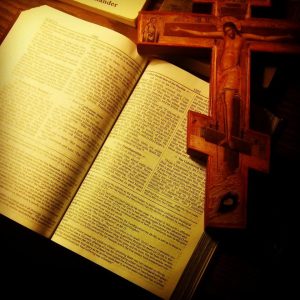 This, of course, is to say nothing of the pure beauty and holiness of the Divine Liturgy. Two Protestants and a Roman Catholic attended; both seemed genuinely touched by it all, and I was honored to share my time and my coming to Orthodoxy with them. Having been strengthened in every possible way by receiving Holy Communion, my trip came near to its end. I said my goodbyes to Fr. Paul and Subdeacon Gideon (a most humourous and warm fellow), and prepared to head back to the world at large.
This, of course, is to say nothing of the pure beauty and holiness of the Divine Liturgy. Two Protestants and a Roman Catholic attended; both seemed genuinely touched by it all, and I was honored to share my time and my coming to Orthodoxy with them. Having been strengthened in every possible way by receiving Holy Communion, my trip came near to its end. I said my goodbyes to Fr. Paul and Subdeacon Gideon (a most humourous and warm fellow), and prepared to head back to the world at large.
Beforehand I knew that the “world” so to speak was not exactly my cup of tea. But I could not get over how the shell-shocked feeling of once again being immersed in the modern secular culture I had left behind for a few days. My wife and I took a short detour through the mall after she had picked me up from the ferry terminal on our way to the Irish Times pub, and I could barely handle not only the physical noise but the spiritual noise as well.
It became rather apparent to me that the world of today cannot handle silence. Sure, we see it promoted, a kind of pseudo-meditative silence, on everything from fridge magnets to the sides of tea boxes, but true quiet wherein one can focus is nearly impossible to find. Most places, it seems to me that a thousand ways are employed in order to cut through silence and dash it to pieces, from the ever-present TVs everywhere blaring to the generic sound of the city life, right down to the tapping on smartphone screens. Anything but silence, because silence can be incredibly uncomfortable, and I don’t think our modern minds are wired for it anymore. As Fr. Alexander Schmemann noted, “The joyless rush is interrupted by relaxation (‘sit back and relax!’), but such is the horror of the strange vaccum covered by this demonic word, ‘relaxation,’ that men must take pills to endure it, and buy expensive books about how to kill this no man’s land of ‘modern living.'”
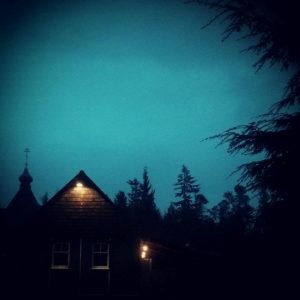 The irony, of course, is that this entire culture of pseudo-therapeutic, New Age feel-goodery has little to offer the person seeking true silence and true peace. For myself, I was tired of the “inspirational” memes flooding the internet, tired of what Fr. Schmemann calls the “joyless rush”, tired of the plethora of distractions offered by a culture where God is viewed as having long since died. I wanted something real, authentic, something that would help me reconnect with the God, the Truth I had searched so long for. As St. Theophan the Recluse advises us, “Cast aside everything that might extinguish this small flame which is beginning to burn within you, and surround yourself with everything which can feed and fan it into a strong fire. Isolate yourself, pray, think over for yourself what you should do.”
The irony, of course, is that this entire culture of pseudo-therapeutic, New Age feel-goodery has little to offer the person seeking true silence and true peace. For myself, I was tired of the “inspirational” memes flooding the internet, tired of what Fr. Schmemann calls the “joyless rush”, tired of the plethora of distractions offered by a culture where God is viewed as having long since died. I wanted something real, authentic, something that would help me reconnect with the God, the Truth I had searched so long for. As St. Theophan the Recluse advises us, “Cast aside everything that might extinguish this small flame which is beginning to burn within you, and surround yourself with everything which can feed and fan it into a strong fire. Isolate yourself, pray, think over for yourself what you should do.”
In some small way, thanks to the holy monks of Vashon Island, I managed to gain a little strength to continue on the Royal Road.
